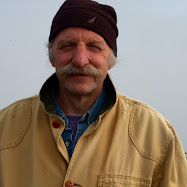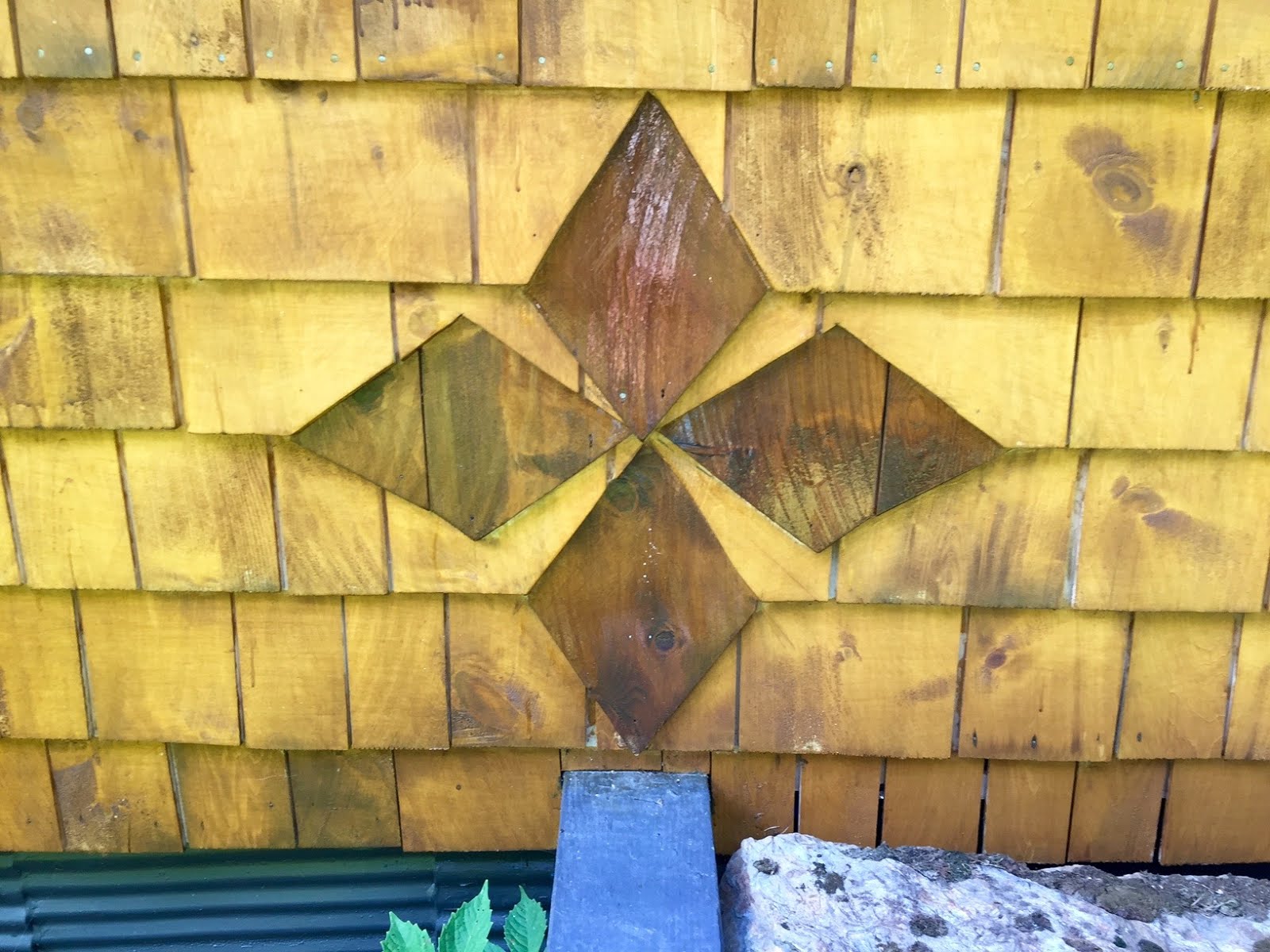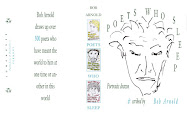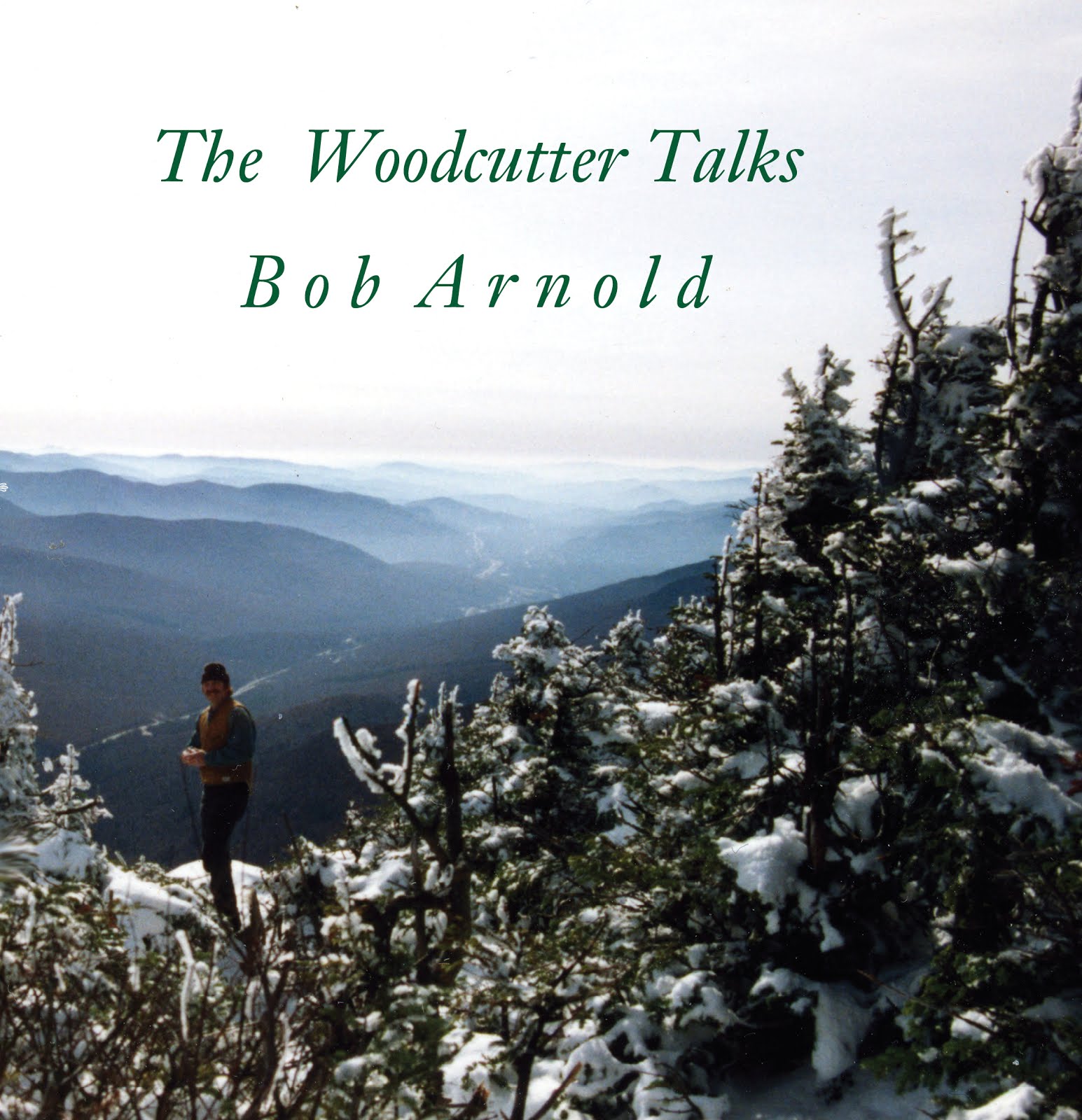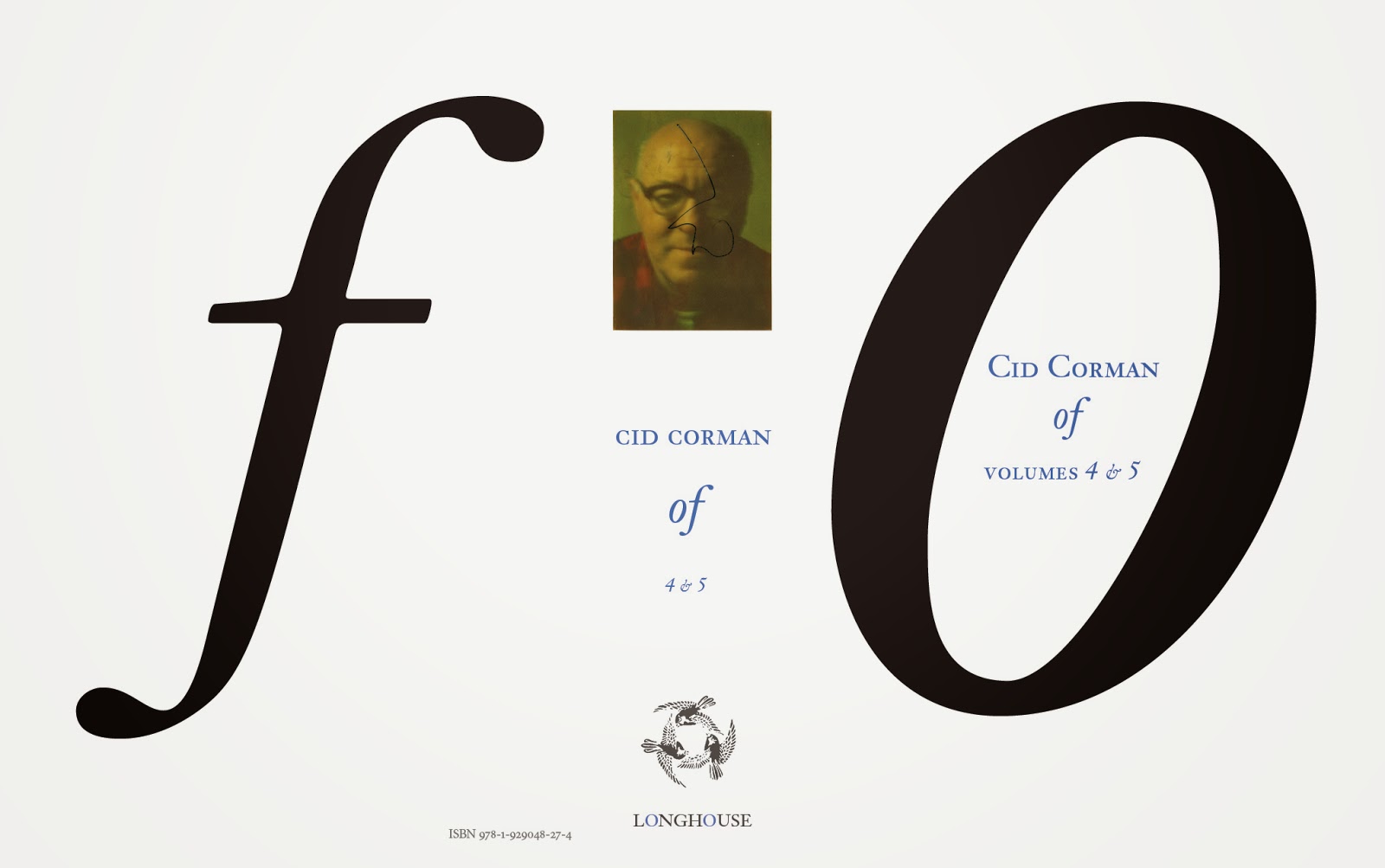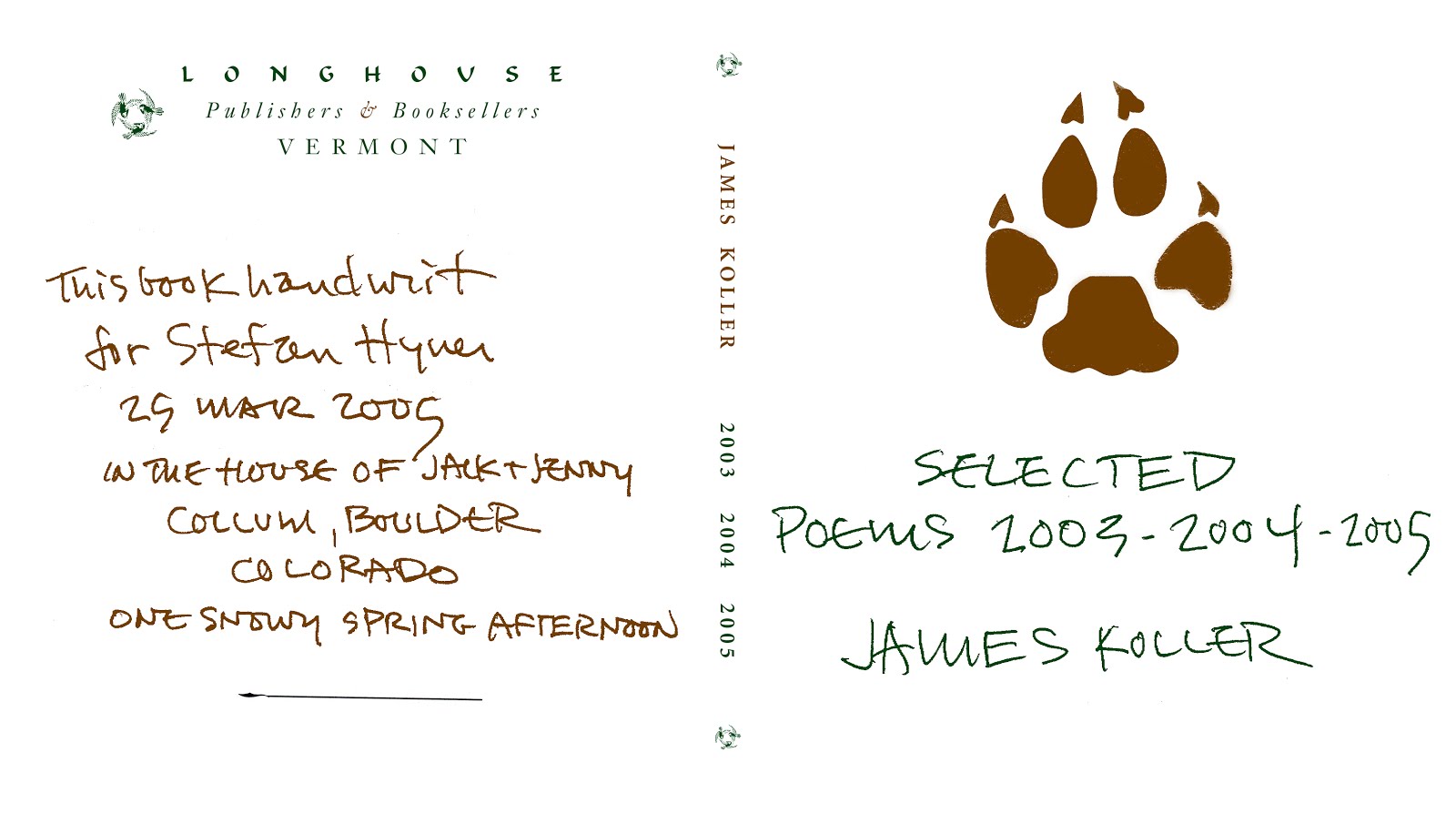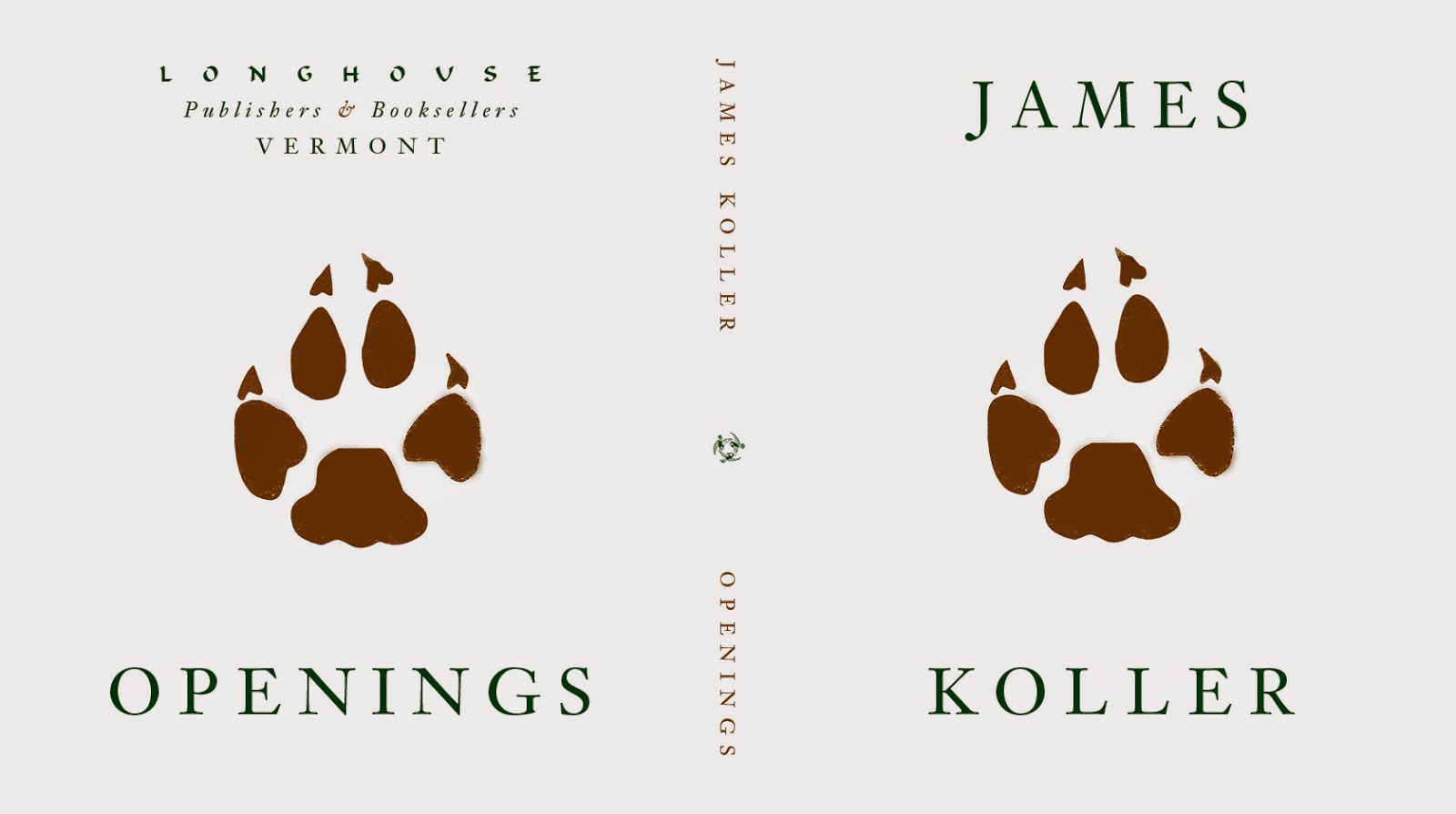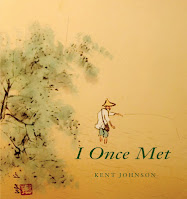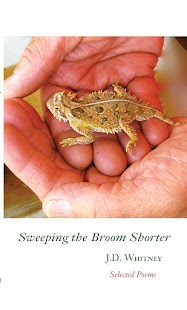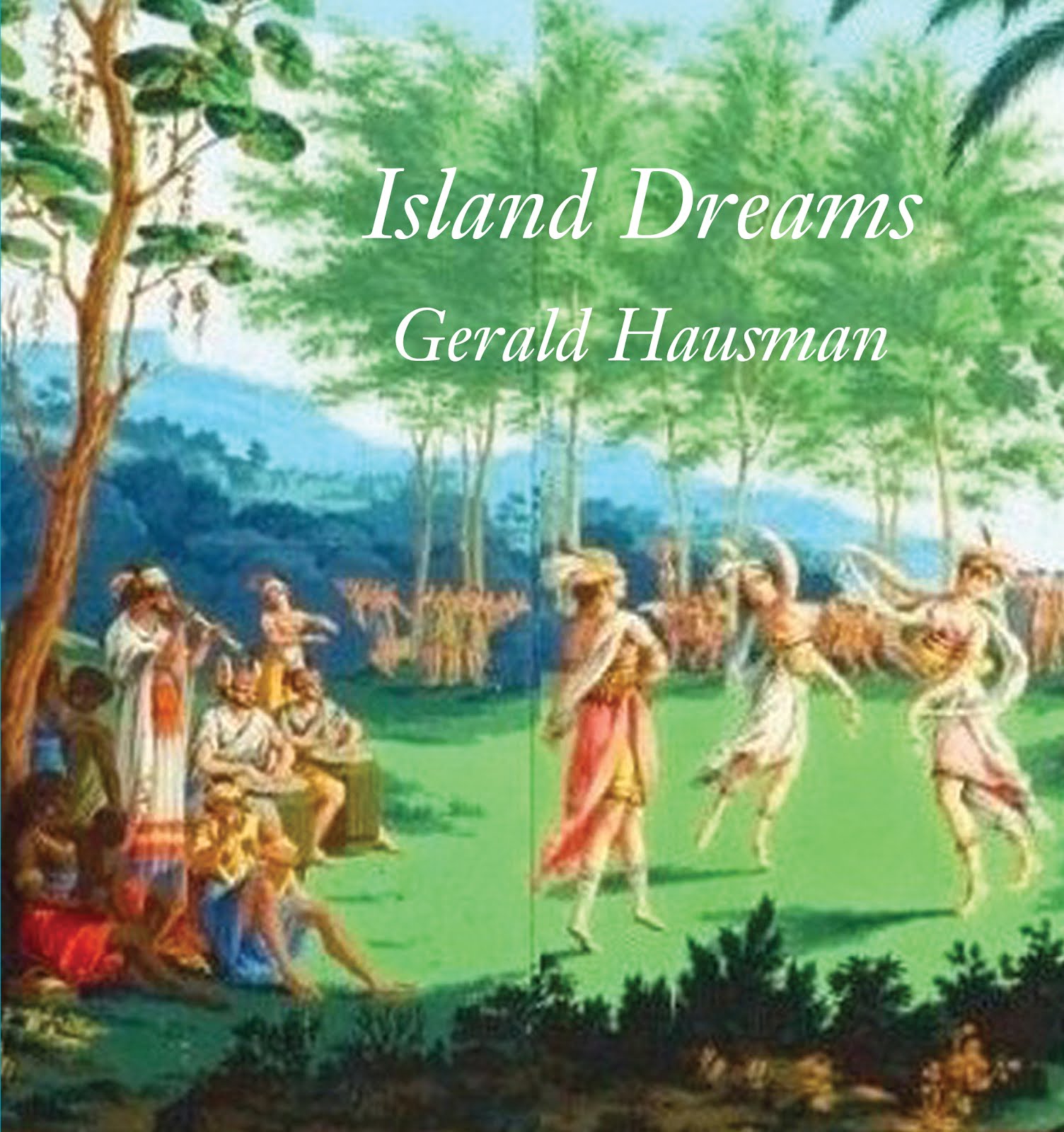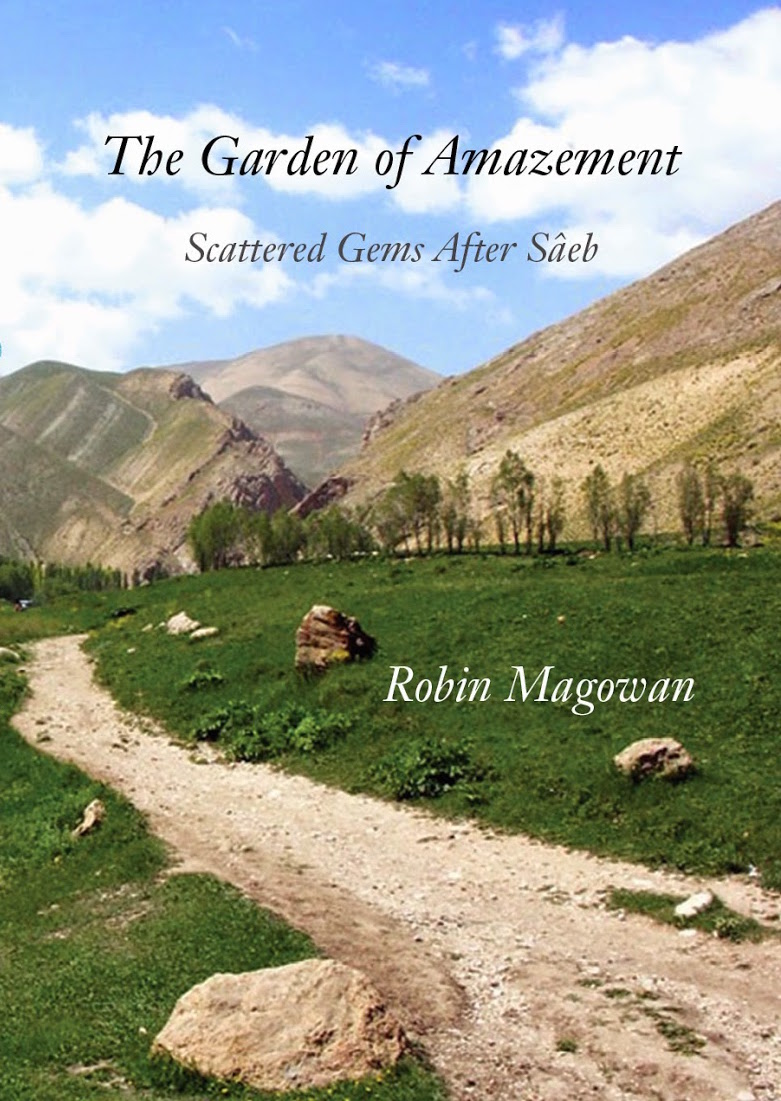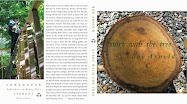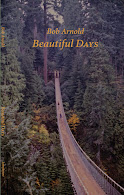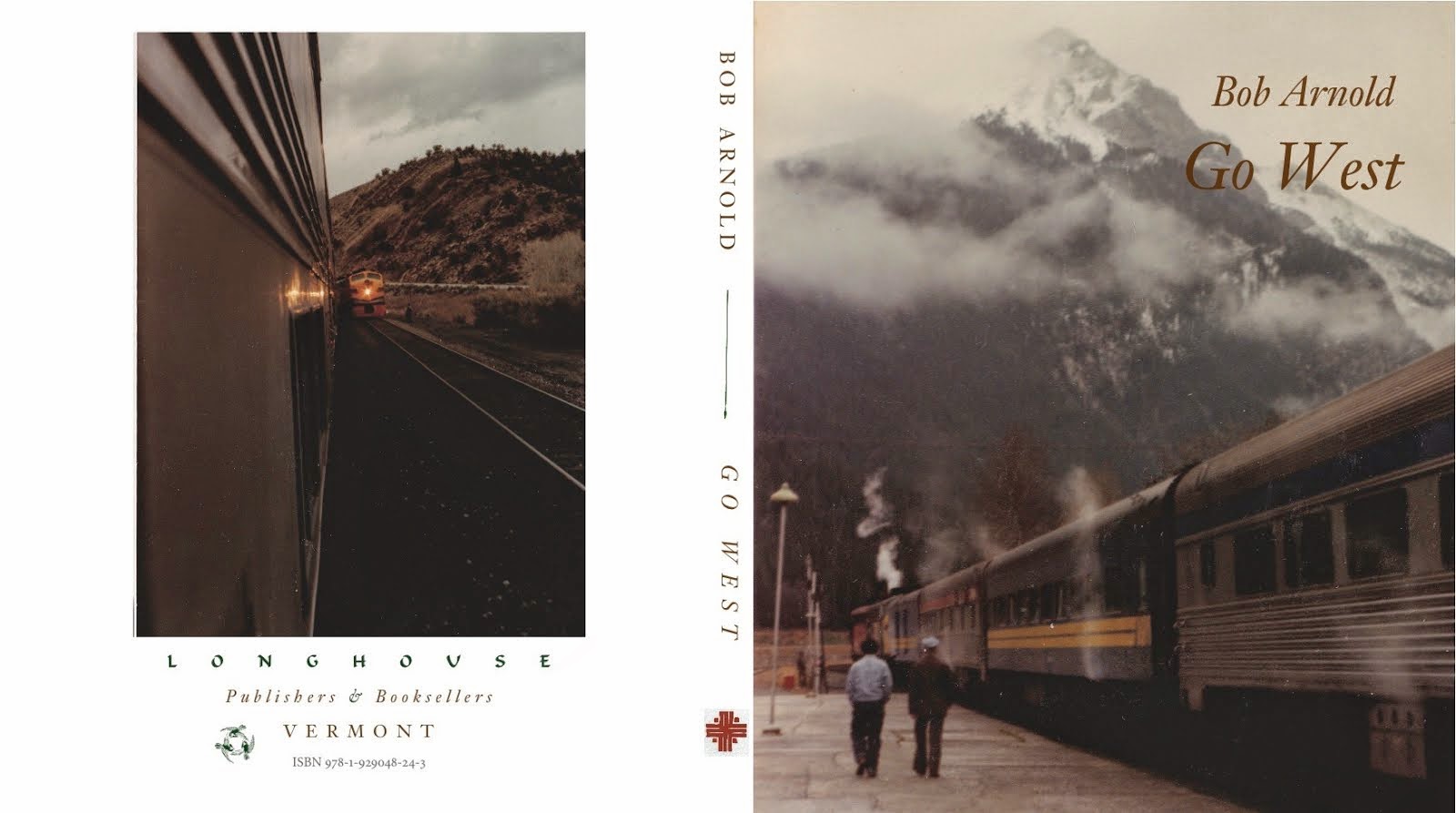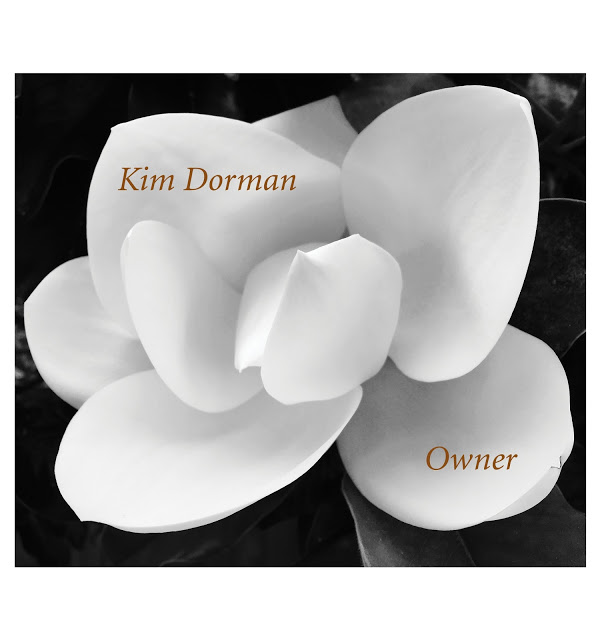Burt Bacharach
Saturday, February 28, 2015
Friday, February 27, 2015
NEW! LORINE NIEDECKER ~
A Cooking Book
Lorine Niedecker
Lorine Niedecker
Longhouse 2015
72 pages, perfect bound, 5.5 x 6.25 inches
ISBN 978-1-929048-29-8
This booklet was sent as a Christmas Gift from
Lorine Niedecker to Maude Hartel in December 1964.
It was in Gail Roub's possession as of August 1991.
In 1992 Lorine Niedecker's then Literary Executor Cid Corman
passed the manuscript over to Longhouse who published
A Cooking Book for the Winter Solstice of that same year.
For Winter Solstice 2014 Longhouse refurbished & reprinted
A Cooking Book in a brand new edition with the original edition
now out of print. These poems were not included in the
Lorine Niedecker: Collected Works (University of California)
edited by Jenny Penberthy.
Lorine Niedecker: Collected Works (University of California)
edited by Jenny Penberthy.
Longhouse is more than happy to keep this little gem available for
new & old readers.
_____________________
$15
U.S. addresses ~ order here through Paypal
shipping is free
International shipping: $10
http://longhousepoetryandpublishers.blogspot.com/2015/01/new-cid-corman-of-volume-4-5.html
Thursday, February 26, 2015
BY HAND ~
'Oenone', Alfred Lord Tennyson, Seven Poems and Two Translations, Doves Press 1902.
The Gorgeous Typeface That Drove Men Mad
and Sparked a 100-Year Mystery
Wednesday, February 25, 2015
PHILIP LAMANTIA ~
photo ~ Harry Redl
Philip Lamantia
I Touch You
I touch you with my eyes when you lie under spiders of silk
I touch you with my one hundred headed giraffes too secret to be seen
the rods & cones the morning covets awaken you
with my touch of tobacco eyes
and you rise from the snail's bed of tubular hair
I touch you with the breath of jet planes
and they are gone elsewhere to touch you too
I won't have you touched by sordid saints
I touch you with the hour that drips scent
snared from the chain of immaculate lice
who avenge themselves forever on the holy of holies
I touch you with the wind heaving the breasts of the morning
I touch you in the overcrowds
and they vanish
replaced by all the women who resemble you
and I touch them with the eyes of the sun
Annihilation of priests
I touch you on the threshold of the totem
carbon salt on the breath of the world
I touch you with my intricate rose superior to the fog
I touch you with heart strings of the veiled mountain
whose magnetic moment is the sight of us making love
I rend your skirt by the wind stolen from ancient castles
your legs secrete the essence of wheat
and your ankles brush the wing of crow
Your lips touch alchemic gold torn from the femur bone of poetry
whispering through archives of your smile
that beguiles the oracle who has a headache to change his legends
I touch your earlobe with the fatal elegance of the peacock lip
your convulsions gallop my heart of the rose hermetic and flushed by goats sighting prey
I touch your nipples
that touch heaven that is all of you touching me
the temple of your hips
the morning glory of your sex
the miracle of bedsheets and the sacrament of sweat
Rhythms of your thighs are the music of the spheres
You are more beautiful than the black buttocks of dawn
and all light has been given to veil you from the murderers of love
I touch your presence undressing the furniture
whose cries fill the distance between us
and you shall hear
when I touch you with telepathic tendrils
for then I'll come into you the light of the walking dream
- - -
You wait you wail
Across the silences
That are a struggle in the world
Obstacles said to be conjunctions of Saturn and the Moon
Objects — telephones — are taboo
Taboo the sky curled into leaden pillars
Taboo the river of racing horses
The sun spits on my fingers
Your little finger completes a sentence
Solitude is a flame of sleep
Jungles fold me in passionate bird omens
Where are you
The page is turning against me like a wave of horses
I'm unsteady on this continent
That throws its chains around all of us
As if we weren't here
Orbiting like apples through galaxies of desire
Your countenance in the clock I map
And your hands brushing the hair invisible
Step by step we come closer
To the Thunderbird's retreat
And beauty cries from a lacerated heart
________________
Philip Lamantia
The Collected Poems of Philp Lamantia
edited by Garret Caples
Andrew Koron
Nancy Joyce Peters
(University of California Press 2013)
Tuesday, February 24, 2015
WEATHER REPORT ~
WEATHER REPORT
It’s late
I’ve been shoveling snow
the woods are dark deep done
and so what if I’m
done shoveling for the night
the snow is still falling
it's been falling for months
it will fall while we sleep
snow doesn’t sleep
it’s here and then it's gone
it isn't worried about your hardship
it will melt in good time
you will forget
about it all
by spring and
spring isn’t in a hurry either
you’re out of luck
It’s late
I’ve been shoveling snow
the woods are dark deep done
and so what if I’m
done shoveling for the night
the snow is still falling
it's been falling for months
it will fall while we sleep
snow doesn’t sleep
it’s here and then it's gone
it isn't worried about your hardship
it will melt in good time
you will forget
about it all
by spring and
spring isn’t in a hurry either
you’re out of luck
Monday, February 23, 2015
Sunday, February 22, 2015
Saturday, February 21, 2015
Friday, February 20, 2015
XUE DI ~
ECHO LAKE
Grant me a favor. Give me to understand your mysterious lake.
Let my white feathers, like eyes shedding expressions, float in your tranquility. The banked rushes,
row after row, are bent like ideograms. The long cries of geese drown out a secret. Tell me, isn't
that secret as chimerical as the sun-chiseled mountains? As enduring?
I beg you to grant me a favor.
Crossing the fields, I walk right into you, my worn feet tramping over your secret as if it were dew
in the grass.
When I enter the lake, its tinted water swallows my skin inch by inch, and a strange and distant
memory comes back to me: my mother massaging my entire body. But her hands now lie at the
bottom of the lake. Motionless there. I walk into you as the sound of music, my most sacred
coronation, your tinted water swallowing my skin inch by inch. I'm in such a tranquil , such a lovely
dreamland, that even when I knock against the sickliest body, I am unable to wake with a start, I stay
asleep in the catapult.
My lips will never recount anything. The world will not pour in or out of them. They sink into the
water and kiss the fish in the weeds. Like time, they take on a cold and lasting silence.
Mysterious lake, let me enter you naked. Let my feeble song fall into your grasses like a length of
yellow ribbon. After you grant me this favor, I will enter the mystery. Break away. All the
misunderstood, let me distance myself from them. Distance, what a pretty hoax. I have lived a brief
time and in a frenzy. I loved poetry with my life. Was that not enough?
_____________________
Xue Di
translated by Hil Anderson & Forrest Gander
ACROSS BORDERS
GREEN INTEGER 2013
"In China, to be a poet is dangerous.
To be a poet means to be honest,
tell people your true feelings.
When the political situation is rough,
writers will be the first group to be oppressed."
Xue Di
Thursday, February 19, 2015
NAJWAN DARWISH ~
Nothing More to Lose
___________________________________
Lay your head on my chest and listen
to the layers of ruins
behind the madrasah of Saladin
hear the houses sliced open
in the village of Lifta
hear the wrecked mill, the lessons and reading
on the mosque's ground floor
hear the balcony lights
go out for the very last time
on the heights of Wadi Salib
hear the crowds drag their feet
and hear them returning
hear the bodies as they're thrown, listen
to their breathing on the bed
of the Sea of Galilee
listen like a fish
in a lake guarded by an angel
hear the tales of the villages, embroidered
like kaffiyehs in the poems
hear the singers growing old
hear their ageless voices
hear the women of Nazareth
as they cross the meadow
hear the camel driver
who never stops tormenting me
Hear it
and let us, together, remember
then let us, together, forget
all that we have heard
Lay your head on my chest:
I'm listening to the dirt
I'm listening to the grass
as it splits through my skin. . .
We lost our heads in love
and have nothing more to lose
Najwan Darwish
NOTHING MORE TO LOSE
translated from the Arabic by Kareem Abu-Zeid
New York Review Books, 2014
Wednesday, February 18, 2015
REAL LIFE ~
Just a note to the recent passing of so many fine poets — like Philip Levine — who I made an immediate Birdhouse memorial page to by selecting one of his poems from his Wesleyan title Not This Pig (1968). A book I pretty much marked up from here to Tuesday with favorite lines and favorite poems way back when in 1968, then I went on to buy and read every one of his books for almost the next half century. He had a wonderful run and the poems stayed true blue, often politically charged and even romantic.
However, Philip Levine wasn't a "working class poet," nor working class as often comes along with any word about him. He held a brief youthful stint at lousy paying jobs, including in an automotive plant, like dozens and dozens of American poets before and after him have done. Like Levine, almost all of that drudgery and work was over with by the time these poets hit age 30, when you're supposed to wise up, or not be trusted. Take your pick. Levine decided, and he did it very well, to mine the memory of that brief automotive time and give us many fine poems right from the guts and grease of that hardware and life. But he did this while going for his college degrees and his long standing job as a professor. He certainly should be honored there. He wasn't a working class worker.
To me a working class worker is one who has earned a paycheck from working class work, a mainstay of the earnings. This puts almost all the renowned poets out of the ranking. That working class paycheck also keeps the recipient in that ranking in almost all social order, meaning diminished. There is no tenure, no pension plan, no golden parachute, no big paycheck awards. Really, there's nothing, they're working until they can almost not work any longer. Far past any retirement age. If they had a state job, they may be in better shape but by then most minds have also been state-shaped. Not a versatile shape.
The self-employed worker is working often pay-check-to-pay- check. If they don't work, they don't eat. If they don't work, they don't buy shoes for their kids. If they don't work, they could freeze to death. Some have pride and would never take a welfare check or any welfare, they're workers. There's deep honor in knowing how to work with one's hands and build things, make things run, make things hold water, make things glow.
There are poets in America to this day who are working class. They work long hours and in deep shade of recognition. They naturally don't fit into the puzzle of poetry schools and poetry circles, they're working, they're getting by, they probably can't always afford to buy your poetry book but they'll check it out of the library. They have such real gem experiences and may not have the finesse or workshop models to make a poem swing into the New Yorker each week, but man their experiences are real stuff magic.
[ BA ]
Tuesday, February 17, 2015
LYNNE TILLMAN ~
"At the beginning, when I started to show my writing to people, to give
readings from it, I had no audience. No one has an audience at the
start, because no one is waiting. Certainly not for your work. To think
that would be delusional. There was no audience for my writing. To the
extent that I have one now, it is because, over time, say, 25 years of
my writing’s being published, people called readers have come upon a
story or novel or essay of mine and thought, I’d like to read more. This
amazing relationship — a reader finding a writer whom he or she would
like to read — begins accidentally and might become a habit or practice.
If I think about readers who look forward to my next novel, I feel
inspired to finish it. Those readers are important to me, though I don’t
write for them. I certainly don’t want to disappoint them with a poor
book or story; but I don’t write for them. I’m encouraged by the thought
of them. In a real sense, readers are more important than writers.
There are too many of us anyway, and too many write books that are
nothing more than words used poorly in sentences that don’t signify in
novels or stories that are primarily thoughtless. But readers — all
readers should exist!"
LYNNE TILLMAN
What Would Lynne Tillman Do?
Red Lemonade, 2014
www.redlemona.de
Monday, February 16, 2015
CHARLES BUKOWSKI ~
A RIOT IN THE STREETS
it's a good day, a good time, anybody can
blow a hole through you at any minute.
they are shooting from the rooftops now
and the night sky is smoking,
red.
what more could you want?
you can watch it on your tv or you
can look outside, it's the same
thing.
they are letting it all out again.
airing it out.
it's healthy.
the cops are hiding.
nobody is bored tonight.
the safest people are already in jail.
everybody feels curiously alive,
at last.
it's party time!
this city is the whole world
and it's running right at you.
it's a good day, a good time!
hell is coming out to play
with you.
9 BAD BOYS
Celine will bat
lead off,
Shostakovich is in the
second
spot,
Dostoevsky should hit
3rd,
Beethoven will definitely bat
clean-up,
Jeffers is in the 5th
spot,
Dreiser can hit
6th
and batting 7th
let's have
Boccaccio
and 8th the
catcher:
Hemingway.
the pitcher?
hell, give me the
fucking
ball.
BARFLY
Jane, who has been dead for 31 years,
never could have
imagined that I would write a screenplay of our drinking
days together
and
that it would be made into a movie
and
that a beautiful movie star would play her
part.
I can hear Jane now: "A beautiful movie star? oh,
for Christ sake!"
Jane, that's show biz, sp go back to sleep, dear, because
no matter how hard they tried they
just couldn't find anybody exactly like
you.
and neither can
I.
SILLY DAMNED THING ANYHOW
we tried to hide it in the house so that the
neighbors wouldn't see.
it was difficult, sometimes we both had to
be gone at once and when we returned
there would be excreta and urine all
about.
it wouldn't toilet train
but it had the bluest eyes you ever
saw
and it ate everything we did
and we often watched tv together.
one evening we came home and it was
gone.
there was blood on the floor,
there was a trail of blood.
I followed it outside and into the garden
and there in the brush it was,
mutilated.
there was a sign hung about its severed
throat:
"we don't want things like this in our
neighborhood."
I walked to the garage for the shovel.
I told my wife, "don't come out here."
then I walked back with the shovel and
began digging.
I sensed
the faces watching me from behind
drawn blinds.
they had their neighborhood back,
a nice quiet neighborhood with green
lawns, palm trees, circular driveways, children,
churches, a supermarket, etc.
I dug into the earth.
___________________________
CHARLES BUKOWSKI
NEW POEMS BOOK 3
edited by John Martin
Virgin Books, 2004
it's a good day, a good time, anybody can
blow a hole through you at any minute.
they are shooting from the rooftops now
and the night sky is smoking,
red.
what more could you want?
you can watch it on your tv or you
can look outside, it's the same
thing.
they are letting it all out again.
airing it out.
it's healthy.
the cops are hiding.
nobody is bored tonight.
the safest people are already in jail.
everybody feels curiously alive,
at last.
it's party time!
this city is the whole world
and it's running right at you.
it's a good day, a good time!
hell is coming out to play
with you.
9 BAD BOYS
Celine will bat
lead off,
Shostakovich is in the
second
spot,
Dostoevsky should hit
3rd,
Beethoven will definitely bat
clean-up,
Jeffers is in the 5th
spot,
Dreiser can hit
6th
and batting 7th
let's have
Boccaccio
and 8th the
catcher:
Hemingway.
the pitcher?
hell, give me the
fucking
ball.
BARFLY
Jane, who has been dead for 31 years,
never could have
imagined that I would write a screenplay of our drinking
days together
and
that it would be made into a movie
and
that a beautiful movie star would play her
part.
I can hear Jane now: "A beautiful movie star? oh,
for Christ sake!"
Jane, that's show biz, sp go back to sleep, dear, because
no matter how hard they tried they
just couldn't find anybody exactly like
you.
and neither can
I.
SILLY DAMNED THING ANYHOW
we tried to hide it in the house so that the
neighbors wouldn't see.
it was difficult, sometimes we both had to
be gone at once and when we returned
there would be excreta and urine all
about.
it wouldn't toilet train
but it had the bluest eyes you ever
saw
and it ate everything we did
and we often watched tv together.
one evening we came home and it was
gone.
there was blood on the floor,
there was a trail of blood.
I followed it outside and into the garden
and there in the brush it was,
mutilated.
there was a sign hung about its severed
throat:
"we don't want things like this in our
neighborhood."
I walked to the garage for the shovel.
I told my wife, "don't come out here."
then I walked back with the shovel and
began digging.
I sensed
the faces watching me from behind
drawn blinds.
they had their neighborhood back,
a nice quiet neighborhood with green
lawns, palm trees, circular driveways, children,
churches, a supermarket, etc.
I dug into the earth.
___________________________
CHARLES BUKOWSKI
NEW POEMS BOOK 3
edited by John Martin
Virgin Books, 2004
Sunday, February 15, 2015
PHILIP LEVINE ~
Philip Levine
(January 10, 1928 – February 14, 2015)
COMING HOMEWARD FROM TOLEDO
We stopped at a beer garden,
drank, and watched the usual farmers
watching us, and gave a dull
country laborer a lift
in the wrong direction. He
giggled by the roadside where
we left him, pissing in snow
and waving, forty frozen
miles from home.
When the engine
failed, we stood in a circle
of our breathing listening for
the sounds of snow.
Later
just before the dawn of the
second day of a new year
already old, we found her
under white heaps, another
city in another time,
and fell asleep, and wakened
alone and disappointed
in a glass house under a
bare wood roof.
I called out for
you, my brothers and friends, and
someone's children came, someone's
wife — puzzled helpful faces —
saying "father" and "husband."
You never answered, never
heard, under the frozen stars
of that old year where the snow
creaked in great mounds and the air
bronzed from the slag heaps twenty
miles south of Ecorse, for you were
happy, tired, and never going home.
_____________________
Philip Levine
Not This Pig
Wesleyan University Press 1968
Subscribe to:
Posts (Atom)





















